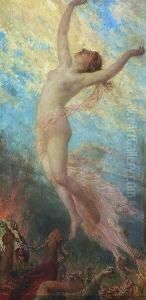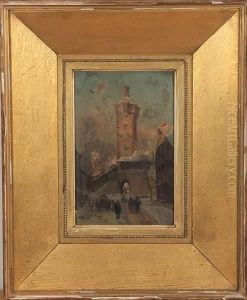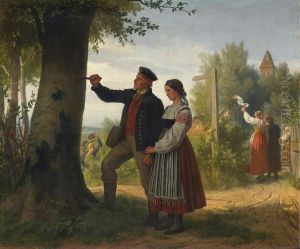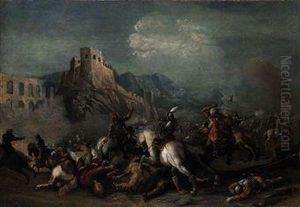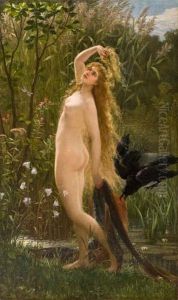Gustav Graef Paintings
Gustav Graef was a German painter, primarily known for his portraits and history paintings. Born on December 14, 1821, in Königsberg (now Kaliningrad, Russia), he showed an early affinity for the arts. His father was a goldsmith, which exposed Graef to the world of fine craftsmanship and aesthetics from a young age. He moved to Berlin to study at the Prussian Academy of Arts under various notable artists including Wilhelm Schadow, who was a key figure in the Düsseldorf school of painting.
Graef's style was heavily influenced by the academic and classical traditions of painting, and he was particularly admired for his skillful rendering of the human figure and his use of color. Early in his career, he earned recognition for his historical and mythological scenes, which were popular in the academic circles of the mid-19th century. However, it was his portraiture that cemented his reputation, as he became a sought-after portraitist among the German aristocracy and bourgeoisie.
In addition to his painting, Graef was an influential art educator, serving as a professor at the Prussian Academy of Arts. His teachings helped shape a new generation of artists, and his emphasis on classical techniques and subjects was a counterpoint to the emerging avant-garde movements that were beginning to challenge the academic norms of the time.
Graef's work was exhibited in various important exhibitions, including the Berlin Art Exhibition and the Great Berlin Art Exhibition, where he often received critical acclaim. Despite the changing artistic landscape of the late 19th century, with the rise of Impressionism and Post-Impressionism, Graef remained committed to his academic roots.
He passed away on November 15, 1895, in Berlin, leaving behind a legacy of work that captures the essence of 19th-century academic art in Germany. Throughout his career, Graef remained a respected figure in German art circles, and his portraits continue to be appreciated for their technical prowess and the insight they provide into the personalities and characters of his subjects.
